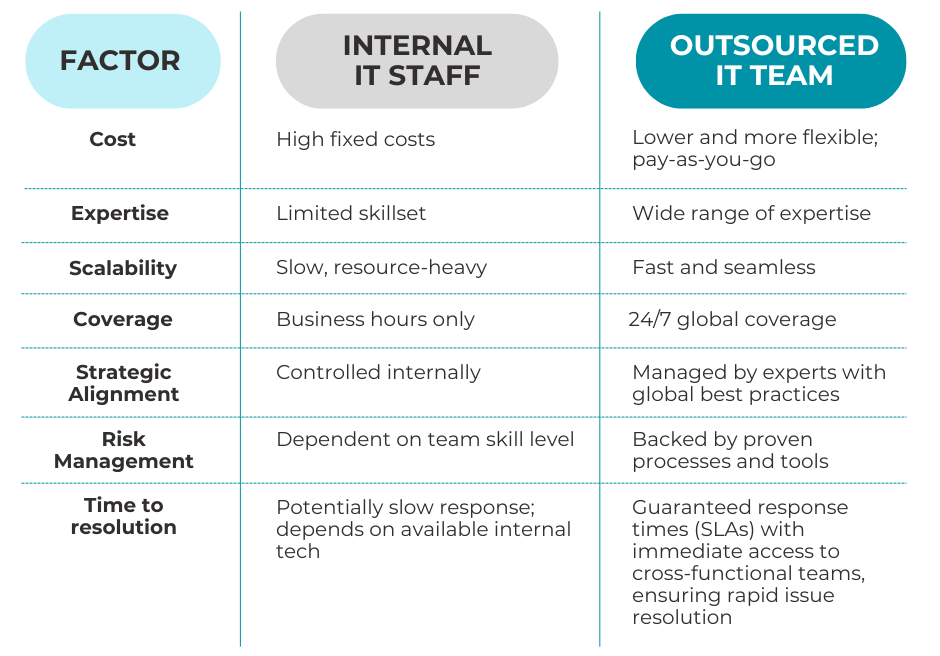
Technology as a tool? Not anymore. It is now the backbone of how modern businesses operate. From cybersecurity and network stability to customer service efficiency and process automation, IT plays a crucial role in making sure companies can grow, adapt, and thrive. But as your business expands, so does the complexity of your IT needs. And the truth is: building and maintaining an in-house IT team isn’t always the smartest or the most cost-efficient move. That’s why more companies across industries are choosing to outsource IT services. It allows companies to access top-tier expertise, cutting-edge technologies, and round-the-clock support without the burden of managing everything in-house. Whether you’re a startup, a growing SME, or a global enterprise, outsourced IT support can help you stay competitive in ways that hiring internally often can’t.
Why IT Support Is Non-Negotiable for Modern Businesses
There’s a big difference between “having IT” and “having strong IT support.” Businesses that thrive today are those that treat IT as a core part of their operations, not an afterthought. IT Support goes beyond fixing technical issues. It enables your business to run without disruptions, protecting sensitive data, and keeping your team productive.
Here are the key reasons why IT support is essential to any organization:
1. Business Continuity
A single technical glitch can bring operations to a halt. Unplanned downtime is costly, not just in lost revenue, but in damaged customer trust. Effective IT support helps prevent these scenarios with proactive maintenance, monitoring, and swift problem resolution.
2. Cybersecurity and Data Protection
The number of cyberattacks against businesses has surged in recent years. According to IBM’s 2025 Cost of a Data Breach Report, the global average cost of a data breach reached $4.4 million. IT support teams put strong cybersecurity frameworks in place like firewalls, encryption, MFA, and monitoring, to safeguard your assets and customer data.
3. Productivity and Operational Efficiency
A slow network, unreliable tools, or frequent IT issues can drain your team’s time and energy. Strong IT support ensures smooth daily operations, enabling employees to focus on strategic work rather than troubleshooting problems themselves.
4. Strategic Technology Implementation
IT isn’t just maintenance, it’s transformation. IT teams can help implement cloud solutions, automate workflows, and deploy technologies that make your business smarter, faster, and more scalable.
5. Regulatory Compliance
Many industries face strict regulations around data protection and privacy. Skilled IT support ensures your systems comply with standards, avoiding hefty fines and reputational damage.

Should You Hire Internally or Outsource IT Services?
When it comes to managing IT, businesses often face a fork in the road: build an in-house team or outsource IT services to a trusted partner like Guided Outsourcing. Both options have their merits, but they serve different business needs. Understanding the trade-offs helps you make an informed, strategic decision.
Many businesses initially lean toward an internal team for a perceived sense of control, yet they often underestimate the long-term operational and financial burden that comes with it.
The internal model requires significant investment in fixed costs like salaries, benefits, training, software licenses, and dedicated office space. Moreover, relying solely on an internal team means your collective expertise is limited to the skill sets of a few individuals, creating critical vulnerabilities if a specialist leaves or if your business suddenly requires an entirely new technology, such as migrating to a multi-cloud environment.
In contrast, when you outsource IT services, you immediately convert those unpredictable fixed costs into a predictable monthly operational expense, and, most importantly, you gain a vast, scalable pool of certified specialists ready to tackle any challenge. The table below breaks down the core distinctions between these two powerful models.
The table below breaks down the core distinctions between these two powerful models.

The choice ultimately depends on your business goals, budget, and appetite for managing IT internally. For many companies, outsourcing IT services provides the perfect balance between cost, expertise, and flexibility.
Signs You Need to Outsource IT Services
Sometimes, companies hesitate to outsource IT support because they feel things are “fine” until they’re not. And many businesses operate in a reactive mode, only considering external help after a significant IT incident or a prolonged period of operational friction. If you’ve been relying on ad hoc fixes, overloading your internal staff, or dealing with frequent disruptions, it might be time to re-evaluate your strategy.
Here are the key indicators that it’s time to outsource IT services:
- Your Team Is Spending Too Much Time on Technical Issues
If your employees (or even your non-IT managers) are constantly troubleshooting basic tech problems, that’s a major productivity drain. Outsourced IT can free up your team to focus on their actual roles.
- You’re Experiencing Frequent Downtime
Unexpected outages, system crashes, or server issues can cost your business dearly. A dedicated outsourced IT support team can proactively monitor systems to catch issues before they snowball.
- You Lack Specialized Expertise
Does your business need expertise in cloud migration, advanced data analytics, specific industry compliance (e.g., PCI DSS, HIPAA), or cutting-edge network architecture, but you don’t have that skill in-house? Hiring individual specialists for every niche is expensive. When you outsource IT services, you gain access to a diverse pool of certified experts on demand.
- You’re Scaling Fast
As businesses grow, so do IT demands. If your infrastructure can’t keep up or your team is stretched too thin, outsourcing allows for seamless scaling.
- Security Concerns Are Growing
Small and midsize businesses are increasingly becoming targets of cyberattacks. If your IT security isn’t robust enough, outsourcing to experienced professionals is a safer, smarter move.
- Your IT Budget Is Unpredictable
Surprise repair costs, unplanned upgrades, or emergency hires can wreak havoc on your budget. Outsourcing IT often comes with predictable pricing models, making financial planning easier.
Recognizing these signs early can prevent costly downtime and operational inefficiencies later on.
How to Get the Most Out of Your Outsourced IT Support
Outsourcing isn’t just about signing a contract and walking away. To get maximum ROI from your outsourced IT services, you need the right strategy and partnership structure in place. Here’s how to make the relationship work for your business, not against it.
1. Define Clear Goals and Expectations
Before onboarding an IT provider, outline what success looks like for your business:
- Do you need 24/7 helpdesk support?
- Is your priority cybersecurity or infrastructure modernization?
- What KPIs will define the partnership’s success?
Clarity upfront helps your provider tailor services to your unique needs.
2. Prioritize Security and Compliance
Ensure your outsourced IT partner follows best practices and meets industry standards, such as ISO certifications or data protection regulations relevant to your business. This is crucial to protect sensitive business and customer information.
3. Choose a Partner with Proven Expertise
Look for partners with a track record of handling businesses similar to yours. Check reviews, case studies, or references to ensure they can deliver quality service—not just promises.
4. Maintain Open Communication
Outsourced IT should feel like an extension of your team. Establish communication protocols—regular reporting, check-ins, and escalation processes—to ensure alignment.
5. Leverage Their Expertise Strategically
A good IT partner doesn’t just fix problems—they help you prevent them. Tap into their knowledge for digital transformation strategies, new technology rollouts, and long-term infrastructure planning.
6. Monitor and Measure Performance
Set and review SLAs (Service Level Agreements) to track uptime, response time, resolution time, and security incidents. Data-driven decisions lead to stronger partnerships.
By treating your outsourced IT provider as a strategic ally, not just a vendor, you maximize the benefits and ensure smooth, future-ready operations.

Conclusion
Your IT infrastructure is the backbone of your business. How you manage it can either enable your growth or hold you back. Building an in-house team has its merits, but outsourcing IT services offers the agility, expertise, and scalability that today’s competitive landscape demands.
From cybersecurity to day-to-day troubleshooting, outsourced IT allows businesses to focus on innovation, growth, and customer experience. And when you partner with the right provider, IT becomes less of a headache and more of a strategic edge.
Outsourcing doesn’t mean replacing your internal team. It means empowering your business with a stronger, more resilient IT ecosystem.
Make IT Work for You
Don’t let IT challenges slow down your growth. Partner with Guided Outsourcing and gain access to world-class IT solutions designed for businesses that want to scale smart. Whether you’re looking to outsource specific IT functions or your entire IT operations, we’ve got your back. Learn more about Guided Outsourcing’s IT services.

